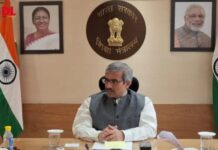Learn your math or watch your job go to China or India. With this modern US version of the Indian parents' nighttime admonition to sleepless kids about Gabbar Singh, president Bush cranked up a new maths initiative in US schools to try and retain US leadership in science and technology.
Bush visited a suburban Washington DC school in an attempt to galvanise interest in math and science even as China's president Hu Jintao began a four-day visit to the US, starting his trip from the western gateway of Seattle, where he first met Microsoft's Bill Gates. Pointedly referring to the visit, Bush said China is a very important strategic friend (to the US) in many ways, and in many ways they pose competition. “It's important to understand if children don't have those skill sets (in maths and science) needed to compete with a child from India, or a child from China, the new jobs will be going there,” Bush told students and teachers at the Parkland Magnet Middle School for Aerospace Technology outside Washington DC.
The US president has increasingly invoked competition from India and China to bestir the American public on issues ranging from energy to education. Urging student to study math and science because they were “cool subjects”, Bush announced the setting up of a National Math Panel which would determine best practices for teaching math in the nation's schools. He also proposed to double federal spending on basic research, piquing student interest by pointing out that both the Internet and iPod were products of government investment in research. Bush's push for maths education came even as the Maharashtra government is pursuing a harebrained scheme of making maths optional after class eight because, according to the state's education minister Vasant Purke, students have a math phobia. Bush's initiatives stems from recent studies that paint a grim picture of declining US competitiveness in the face of the rising number of science and engineering graduates from China and India.
















